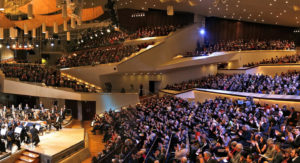
Berlin’s Philharmonie hall in the “normal” concert days
© www.visitberlin.de
Could virtual concerts become the norm following the COVID-19 outbreak?
With economies, companies and groups around the world taking a major financial hit due to lockdown restrictions, some orchestras and ensembles might have to rely upon the virtual world to survive. So perhaps, with the flood of groups, even the Berlin Philharmonic offering free access to their catalogue, maybe that isn’t the smartest business proposition for them now.
Once people are hooked on free as the price point, it is so hard to begin to charge. Look at how many newspapers that once gave their online stories away for free which have now closed.
Depending on how long people have to be isolated from one another, and when we do get back to a normal world, just how normal will that be for people who gather in large crowds, like in concert halls? The fear that I see in people just walking to the local shops as they move away from me on a footpath, how quickly will that fear dissipate once the all-clear is given and we can get back to our “normal” lives?
Will we all be saying, OK, time for a concert among 2000 or even 20 other people now COVID-19 is under control, I doubt it. And as a good deal of classical music concert halls are filled with older people, I’d guess that many won’t be rushing back to hear live music again soon.
The flow-on effects from this pandemic might just mean that concert halls remain empty for some time, perhaps years. What will happen to live classical music then? Can every orchestra turn to online streaming? How can orchestral or any music players get together to perform? What about community orchestras and choirs who barely have a budget and are filled with older players? How will they survive? I’m guessing they won’t.
There could be many groups who just give up after this pandemic. But the ones who don’t might become more popular and better known if they find new ways to attract their audiences.
Dan Russell, violinist and leader of the Phoenix Collective says, “Perhaps the online aspect will open up more opportunities and reach wider audiences or perhaps become lost in a plethora of online content. Being creative and having a point of difference may be crucial for survival”.
After COVID-19, we probably should be taking small steps to gain back classical music followers. Like for live-streamed concerts, groups could set up a donation system while still offering free virtual music.
During times of crises, it’s time to get inventive. We need to come up with ways around this predicament to secure future growth. Concert hall doors and music venues may be closed, but our minds and imaginations don’t have to be. We can all learn from one another. Not every application or solution is going to work across the board between countries or groups, but as we’ve seen, the will to continue in the face of disaster is strong in the classical music world.
Turning to music in times of calamity is normal for almost every one of us. Classical music has been unifying countries and societies for as long as it has been around. That will continue. But, how will it continue? Will concert halls remain empty after this outbreak? Or will concerts go online? What do you want to see happen with live music performance? I want it to get back to where it was, and one more thing, I want it to grow.
As far as I know, nothing has ever halted the progress of classical music. Composers, players and listeners have kept this genre thriving for hundreds of years. When we all get to the other side of COVID-19, and any further future disruptions or roadblocks, my suggestion is there is one thing that we can do that will maintain classical music forever, and that’s to #KeepPlaying.




